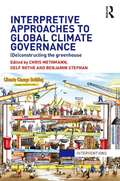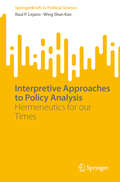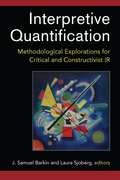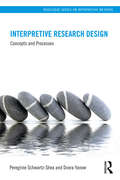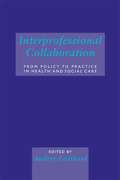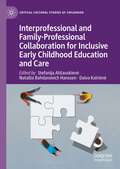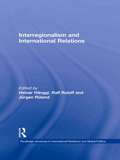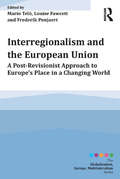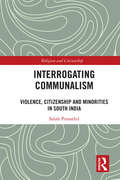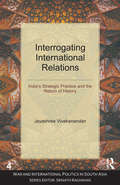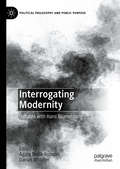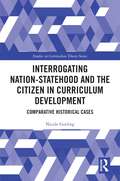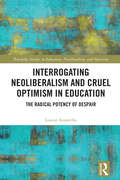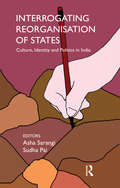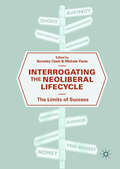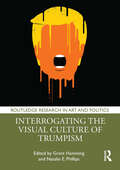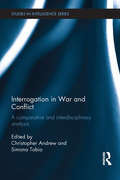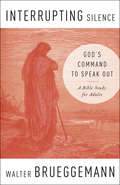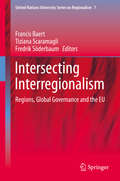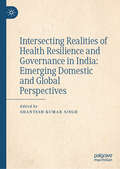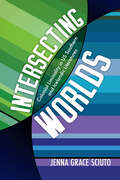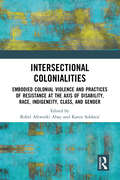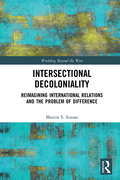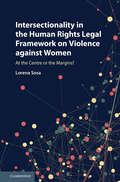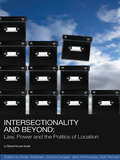- Table View
- List View
Interpretive Approaches to Global Climate Governance: (De)constructing the Greenhouse (Interventions)
by Delf Rothe Benjamin Stephan Chris MethmannGlobal climate change is perceived to be one of the biggest challenges for international politics in the 21st century. This work seeks to fuse a global governance perspective together with different interpretive approaches, offering a novel way of looking at international climate politics. Equipped with a common interpretive tool-kit, the authors examine different issue-areas and excavate the contours of an overall pattern – the depoliticisation of climate governance. It is this concept which represents the overarching theme connecting the different contributions, addressing issues such as how the securitization of climate change conceals its socio-economic roots; how highly political decisions and value-judgements are couched in the terms of science; how the reframing of climate change as a matter of economic calculation and investment narrows the scope of political action; and how the prevailing concentration on technological solutions to climate change turns it into a mere administrative issue to be tackled by experts. Highlighting the depoliticisation of highly political issues provides a means to bring the political back into one of the most important issue areas of 21st century world politics. The editors have assembled a series of 14 interpretive inquiries into discourses of global climate governance which aim to flesh out an interpretive methodology, demonstrating the value it offers to those seeking to achieve a better understanding of global climate governance. This work will be of great interest to students and scholars of environmental politics, political theory and climate change.
Interpretive Approaches to Policy Analysis: Hermeneutics for our Times (SpringerBriefs in Political Science)
by Raul P. Lejano Wing Shan KanThis Brief provides researchers with an introduction to interpretive approaches for analyzing public policies. It introduces several real-world policy situations where the lack of an interpretive focus limits the analysis and precludes better policy responses. It takes an integrative point of view, with an openness to combining the insights from interpretive and positivist approaches in policy analysis, noting the ability of the interpretive approach to make sense of data while uncovering the otherwise hidden ideological and normative bases of other types of analyses. While not a 'how-to" methods book, this Brief provides sufficient discussion of different ways to find meaning in texts, such as narrative and discourse analysis, or cultural/ethnographic readings of the social and material artifacts found in a place, as well as uncovering meaning from direct engagement with subjects through interviews, action research, and other strategies. The main intent of the book is to convince policy scholars of the usefulness of interpretive thinking, which entails answering the questions: "what does it mean to interpret?" and "what do we gain from interpreting?" As such, this Brief will be of interest to scholars in public policy, public administration, and political science as well as researchers in applied fields (e.g., environmental studies, race and gender studies, urban planning, sociology) engaged in policy analysis.
Interpretive Quantification: Methodological Explorations for Critical and Constructivist IR
by J. Samuel Barkin Laura SjobergCountering the growing divide between positivists who embrace quantitative, numerical approaches and post-positivist scholars who favor qualitative, interpretive approaches, J. Samuel Barkin and Laura Sjoberg argue that both methods are more widely adaptable than is commonly assumed by either camp. In Interpretive Quantification, ten highly regarded scholars in the field of International Relations apply quantitative methods and formal models to specific constructivist and critical research questions. In this way, each chapter serves not only as evidence that methods can productively be applied across paradigms, but also as a guide as to how this may be done. In sum, the contributors make a compelling case that when researchers cordon off particular methods for merely ideological reasons, they circumscribe their own paradigms and hinder their own research agenda.
Interpretive Research Design: Concepts and Processes (Routledge Series on Interpretive Methods)
by Dvora Yanow Peregrine Schwartz-SheaResearch design is fundamental to all scientific endeavors, at all levels and in all institutional settings. In many social science disciplines, however, scholars working in an interpretive-qualitative tradition get little guidance on this aspect of research from the positivist-centered training they receive. This book is an authoritative examination of the concepts and processes underlying the design of an interpretive research project. Such an approach to design starts with the recognition that researchers are inevitably embedded in the intersubjective social processes of the worlds they study. In focusing on researchers’ theoretical, ontological, epistemological, and methods choices in designing research projects, Schwartz-Shea and Yanow set the stage for other volumes in the Routledge Series on Interpretive Methods. They also engage some very practical issues, such as ethics reviews and the structure of research proposals. This concise guide explores where research questions come from, criteria for evaluating research designs, how interpretive researchers engage with "world-making," context, systematicity and flexibility, reflexivity and positionality, and such contemporary issues as data archiving and the researcher’s body in the field.
Interprofessional Collaboration: From Policy to Practice in Health and Social Care
by Audrey LeathardInterprofessional collaboration in the health and social care services has become a commanding force, spear-headed by the Government's modernisation programme to improve partnership. Interprofessional Collaboration highlights the benefits and factors arising from working together for patients, service users and carers through a review of theoretical models illustrated by relevant examples. Discussion of topical problems being faced by practitioners, managers, and policy-makers in the health and social care sector covers:*Policy issues from various interprofessional angles, including the place of management, ethical issues and technology*The application of policy to practice in working together across professions, sectors and communities, giving an overview of teamwork, new primary care policies, interprofessional agendas for family support and mental health, and users' and carers' perspectives on collaboration in practice*Policy and practice in learning together, including theoretical challenges and developments internationally.Relevant for all those that have an interest in matters of health, social care, welfare and caring, Interprofessional Collaboration provides comprehensive coverage on interprofessional education and policy in the UK and abroad.
Interprofessional and Family-Professional Collaboration for Inclusive Early Childhood Education and Care (Critical Cultural Studies of Childhood)
by Natallia Bahdanovich Hanssen Stefanija Ališauskienė Daiva KairienėThis edited volume covers issues related to educational research and practices for early childhood education and care (ECEC), highlighting interprofessional and family-professional collaboration within inclusive education in different cultural contexts. Contributors include authors from throughout Europe, including Lithuania, Norway, Iceland, Finland, Sweden, Spain, UK, and Ukraine. Chapters provide a forum for intentional dialogue about and shared understanding of successful and inspiring ECEC practices, the main barriers of interprofessional and family-professional collaboration, and opportunities for further improvement of inclusive ECEC practices.
Interregionalism and International Relations: A Stepping Stone to Global Governance? (Routledge Advances in International Relations and Global Politics #Vol. 38)
by Jürgen Rüland Heiner Hänggi Ralf RoloffInterregionalism, the institutionalized relations between world regions, is a new phenomenon in international relations. It also a new layer of development in an increasingly differentiated global order. This volume examines the structure of this phenomenon and the scholarly discourse it is generating. It takes stock of empirical facts and theoretical explanations, bringing together with clarity and concision the latest research on this key area. This essential new book: * traces the emergence of interregionalism and reviews the latest literature * provides a conceptual and theoretical framework for study * includes case studies of inter-regional relations between: Asia and America; Asia and Europe; Europe and America; and Europe and Africa. * delivers comparative analyses and special cases such as continental summits and interregional relationships beyond the Triad. * summarizes and evaluates the findings of each chapter, providing a basis for further research. This is a key reference book for students and researchers of regionalism, global governance and international relations.
Interregionalism and the European Union: A Post-Revisionist Approach to Europe's Place in a Changing World (Globalisation, Europe, Multilateralism series)
by Louise Fawcett Mario Telò Frederik PonjaertIs the EU isolated within the emergent multipolar world? Concentrating on interregional relations and focussing on the European Union’s (EU) evolving international role with regards to regional cooperation, this innovative book collects a set of fresh empirical analyses of interregional ties binding the EU with its Eastern and Southern neighbourhood, as well as with Asia, Africa and the Americas. The 25 leading authors from 5 continents have contributed original and diverse chapters and the book advances a novel theoretical ‘post-revisionist’ approach beyond both the Eurocentrism of ‘Europe First’ perspectives as well as the Euroscepticism of those advocating to simply move ’Beyond Europe’. After a Foreword by A. Acharya, the book’s five sections reflect the main drivers of EU interregional policies: The European Union as a Sophisticated Laboratory of Regional and Interregional Cooperation (with chapters by M. Telò, L. Fawcett and T. Risse), De Facto Drivers of Regionalism (F. Ponjaert, M. Shu, A. Valladão and C. Jakobeit), De Jure Drivers of Regionalism (S. Lavenex, G. Finizio, C. Jakobeit, R. Coman, C. Cocq & S. Teo L-Shah), Cognitive Drivers of Regionalism (J. Rüland, E. Fitriani, S. Stavridis & S. Kingah, P. Bacon), and Instrumental Drivers of Regionalism (B. Delcourt, C. Olsson & G. Müller, A. Malamud & P. Seabra and L. Fioramonti & J. Kostopoulos).
Interrogating Communalism: Violence, Citizenship and Minorities in South India (Religion and Citizenship)
by Salah PunathilThis book examines conflict and violence among religious minorities and the implication on the idea of citizenship in contemporary India. Going beyond the usual Hindu-Muslim question, it situates communalism in the context of conflicts between Muslims and Christians. By tracing the long history of conflict between the Marakkayar Muslims and Mukkuvar Christians in South India, it explores the notion of ‘mobilization of religious identity’ within the discourse on communal violence in South Asia as also discusses the spatial dynamics in violent conflicts. Including rich empirical evidence from historical and ethnographic material, the author shows how the contours of violence among minorities position Muslims as more vulnerable subjects of violent conflicts. The book will be useful to scholars and researchers of politics, political sociology, sociology and social anthropology, minority studies and South Asian studies. It will also interest those working on peace and conflict, violence, ethnicity and identity as also activists and policymakers concerned with the problems of fishing communities.
Interrogating International Relations: India's Strategic Practice and the Return of History (War and International Politics in South Asia)
by Jayashree VivekanandanThe book interrogates the disciplinary biases and firewalls that inform mainstream international relations today, and problematises the several tropes that have come to typify the strategic histories of post-colonial societies such as India. Questioning a range of long-held cultural representations on India, the book challenges such portrayals and underscores the centrality of context and contingency in any cultural explanation of state behaviour. It argues for a historico-cultural understanding of power and critiques IR’s tendency to usher in a selective ‘return of history’. Taking two contrasting case studies from medieval Indian history, the book assesses the success and failure of the grand strategy pursued by the Mughal empire under Akbar. The study emphasises his grand strategy of accommodation, defined by the interplay of critical variables such as distance and the vast military labour market. The book also looks at his conscious attempt to indigenise power by projecting himself as the personification of the ideal Hindu king. This case study helps to contextualise the many critical transitions that occurred in international relations: from medieval empires to the modern state system, and from an indigenised, experiential understanding of power to its absolute, abstract manifestations in the colonial state.
Interrogating Modernity: Debates with Hans Blumenberg (Political Philosophy and Public Purpose)
by Daniel Whistler Agata Bielik-RobsonInterrogating Modernity returns to Hans Blumenberg's epochal The Legitimacy of the Modern Age as a springboard to interrogate questions of modernity, secularisation, technology and political legitimacy in the fields of political theology, history of ideas, political theory, art theory, history of philosophy, theology and sociology. That is, the twelve essays in this volume return to Blumenberg's work to think once more about how and why we should value the modern. Written by a group of leading international and interdisciplinary researchers, this series of responses to the question of the modern put Blumenberg into dialogue with other twentieth, and twenty-first century theorists, such as Arendt, Bloch, Derrida, Husserl, Jonas, Latour, Voegelin, Weber and many more. The result is a repositioning of his work at the heart of contemporary attempts to make sense of who we are and how we’ve got here.
Interrogating Nation-Statehood and the Citizen in Curriculum Development: Comparative Historical Cases (Studies in Curriculum Theory Series)
by Nicole GotlingThis book dives into the histories of nation-state-building and curriculum formation to explore the ways that they intertwine, form and inform each other.This book follows the understanding that nation-states have – and still do – develop their educational institutions, curricula, and teaching materials with specific goals and with a specific idea of the ideal student and citizen they want to create in mind. In particular, it advocates that analyzing multiple, idiosyncratic cases can inform the connection between what we learn, how we learn it, and who we become as citizens and further, that this is related not to linear or global phenomena, but to particular nation-states, curricula, and time periods. This book focuses on the comparison between four cases during the time of the large, map-changing events and period of the Prussian Wars (1864–1871) to make the intertwined relationships between nation-states and their curricula, designed to create future loyal citizens, more apparent. It makes a point of reconstructing each of the nation-states' historical national-political and educational processes, and then the reconstructed trajectories are compared both in their own trajectories over time throughout the 19th century and up until World War II and in relation to other nation-states' trajectories over the same long timespan.Exploring a new pathway into research on the intersection of education, curriculum, and nationalism and providing a new, extensively researched and formed methodological framework, it will appeal to researchers, academics, and postgraduates with interests in comparative and international education, curriculum studies, the history of education, nationalism, state-building, and textbook analysis.
Interrogating Neoliberalism and Cruel Optimism in Education: The Radical Potency of Despair (Routledge Studies in Education, Neoliberalism, and Marxism)
by Louise AzzarelloThis book is a philosophical examination of the ways in which neoliberalism underpins and impedes public education. It proposes that education’s adoption of neoliberal logic generates a sense of despair amongst educators, who often enter the profession with the hope of building a better, more just world.Drawing on the author’s 27 years of experience as a secondary classroom teacher and engaging with a range of theoretical concepts, cultural objects, and scenes of violence from her time in the classroom, The Radical Potency of Despair renders visible the ongoing harms that neoliberal logic creates for education and educators. The author proposes a new “ruptured fantasy of education” and suggests that it is not hope that ignites educators who keep fighting for education, but rather despair. Despair is conceived of as a generative force, provoking educators to hold time and space open for pedagogical encounters that interrupt the ongoing instrumentalization of education. The author further conceptualizes a notion of thinking with images as a pedagogical interruptive force. Thinking with images, she argues, gives students time and space to attend to what they see, thus affording them the chance to think differently about the violence of modern society. Such pedagogical interruptions are presented as a refusal of the normative order of education, countering present infrastructures that aim to constrain and instrumentalize education.A compelling and original volume, it will appeal to scholars, researchers, and upper-level students with interests in neoliberalism and education, the philosophy of education, critical pedagogy, and educational policy and politics.
Interrogating Reorganisation of States: Culture, Identity and Politics in India
by Asha SarangiThe volume analyses the complex historical and political context for the processes of state formation in independent India. It provides both a conceptual and empirical framework for an understanding of Indian democracy through the perspective of reorganisation of states.Following the recommendations of the States Reorganisation Commission (SRC) in 1956, the territorial boundaries of the states were redrawn. However, within a decade, the geo-linguistic and cultural-ideological criteria could not be considered satisfactory for the future division of states. With the formation of three new states (Chhattisgarh, Uttarakhand and Jharkhand) and the demand for Telangana statehood not accepted as yet, new dimensions and perspectives about state formation as a critical political practice have surfaced yet again in contemporary India. The book addresses a number of significant themes related to states reorganisation and its effects — questions of underdevelopment, size, political participation, governance, cultural identities — and also analyses the demand for smaller states. It focuses on different states, their historical and contemporary trajectory leading to the demand for territorial remapping and thus recognising specific political and cultural resources, and identities in the regions and sub-regions of states in India.The book will be useful for those studying politics, history, sociology, comparative politics and South Asian Studies.
Interrogating the Neoliberal Lifecycle: The Limits Of Success
by Beverley Clack Michele PauleIn this timely collection, contributors from a number of disciplines discuss neoliberal visions of success, and the subsequent effects they have on the construction of the lifecycle. Frequently mentioned in popular political discourse, the notion of neoliberalism is often deployed as shorthand for the consensus that austerity is necessary and the hard-working individual can survive it. This volume unpicks and interrogates the term by engaging with the interface between the political ubiquity of neoliberal forms and its lived experience in neoliberal societies, cutting across a multiplicity of factors including gender, age, and access to education. Impressive in its wide scope and analysis, Interrogating the Neoliberal Lifecycle presents an informed discussion not only of the limits of the neoliberal paradigm but also of possible alternatives.
Interrogating the Visual Culture of Trumpism (Routledge Research in Art and Politics)
by Grant Hamming Natalie E. PhillipsBringing together scholars from art history, visual studies, and related disciplines, this edited volume asks why Trumpism looks the way it does and what that look means for American—and global—society.Grouped into six categories, the essays in this volume tackle some of the most perplexing—and urgent—aspects of the Trumpist visual project. Two of the most striking aspects of that project are its use of novel commodity forms, including the iconic red baseball caps, as well as its embrace of social media. Trump’s outlandish persona and striking physicality have lent themselves to caricature both from his critics and, perhaps more surprisingly, his supporters. That physicality—as well as his movement’s hearkening back to a (mostly imagined) era of mid-twentieth-century prosperity—has also brought gender and the body into sharp focus. Perhaps second only to the aforementioned red hat is Trumpism’s vigorous use of interventions into public space, including traditional campaign signs as well as flags and other ad hoc visual and architectural materials. Finally, there were the events of January 6, 2021, when many of Trumpism’s most outré visual and cultural preoccupations exploded from the shadows onto television screens across the country. Taken as a whole, the essays in this book examine Trumpist visuality from the seemingly trivial to the starkly horrifying, as well as offering a measured sense of the various resistances and responses that have characterized artistic responses to Trump from the beginning of his prominence.The book will be of interest to scholars working in art history, visual culture, American studies, and cultural and media studies.
Interrogation in War and Conflict: A Comparative and Interdisciplinary Analysis (Studies in Intelligence)
by Christopher Andrew Simona TobiaThis edited volume offers a comparative and interdisciplinary analysis of interrogation and questioning in war and conflict in the twentieth century. Despite the current public interest and its military importance, interrogation and questioning in conflict is still a largely under-researched theme. This volume’s methodological thrust is to select historical case studies ranging in time from the Great War to the conflicts in former Yugoslavia, and including the Second World War, decolonization, the Cold War, the ‘Troubles’ in Northern Ireland and international justice cases in The Hague, each of which raises interdisciplinary issues about the role of interrogation. These case-studies were selected because they resurface previously unexplored sources on the topic, or revisit known cases which allow us to analyse the role of interrogation and questioning in intelligence, security and military operations. Written by a group of experts from a range of disciplines including history, intelligence, psychology, law and human rights, Interrogation in War and Conflict provides a study of the main turning points in interrogation and questioning in twentieth-century conflicts, over a wide geographical area. The collection also looks at issues such as the extent of the use of harsh techniques, the value of interrogation to military intelligence, security and international justice, the development of interrogation as a separate profession in intelligence, as well as the relationship between interrogation and questioning and wider society. This book will be of much interest to students of intelligence studies, strategic studies, counter-terrorism, international justice, history and IR in general.
Interrupting Silence: God's Command To Speak Out
by Walter BrueggemannSilence is a complex matter. It can refer to awe before unutterable holiness, but it can also refer to the coercion where some voices are silenced in the interest of control by the dominant voices. It is the latter silence that Walter Brueggemann explores, urging us to speak up in situations of injustice. <P><P>Interrupting Silence illustrates that the Bible is filled with stories where marginalized people break repressive silence and speak against it. Examining how maintaining silence allows the powerful to keep control, Brueggemann motivates readers to consider situations in their lives where they need to either interrupt silence or be part of the problem, convincing us that God is active and wanting us to act for justice.
Intersecting Interregionalism
by Francis Baert Tiziana Scaramagli Fredrik SöderbaumThis book has two mutually reinforcing aims/parts. The first aim is to contribute to a more productive debate between different theoretical standpoints. There is surprisingly little theoretical and conceptual debate in this burgeoning field, which is one major reason for the failure to fully grasp the diversity of today's interregionalism. Too often theorists speak past each other, without really engaging with alternative theoretical perspectives or competing research results. Indeed, this book constitutes the first systematic attempt to bring together leading theories and theorists of interregionalism. Leading scholars from around the world develop their own distinctive theoretical perspectives on interregionalism, with a particular emphasis on the dynamic relationship between regionalism and interregionalism. These highly acclaimed theorists have all been associated over the years with a variety of disciplines, institutions, schools and debates and so bring a rich set of insights and connections to this pioneering project. The second part of the book 'unpacks' and problematises the region, the driving actors and institutions that are engaged in interregional relations. There is a strong tendency in the field to treat regions as coherent units actors in an interregional relationship, and such simplified notions about 'regions' and 'regional organisations' necessarily result in superficial and misleading understandings of interregionalism. This part of the book connects the theoretical discussion in the first part with a manageable empirical object.
Intersecting Realities of Health Resilience and Governance in India: Emerging Domestic and Global Perspectives
by Shantesh Kumar SinghThe book delves into the intricate interplay between health resilience and governance in the context of India, providing a thorough examination of critical domestic and international issues. It examines the multifaceted challenges faced by India concerning the health of its populace, the impacts of nonconventional security concerns, and the effectiveness of governance mechanisms in addressing these issues. With a multidimensional lens, it analyses the convoluted connections between health outcomes and multiple factors, shedding light on the complex web of health risks. Moreover, it critically evaluates the existing governance frameworks in India, assessing their strengths and weaknesses in dealing with the complex domestic and international challenges posed by the intersection of health and other emerging nontraditional security issues. It synthesizes extensive research and empirical data, presenting a nuanced understanding of the current scenario and exploring innovative solutions and policy recommendations. This book investigates valuable domestic and international perspectives and provides insights to diplomats, foreign and domestic policymakers, researchers, and practitioners by addressing research gaps and understanding within the realms of health resilience and governance in India. It serves as a foundational resource for comprehending the dynamics of these issues in the Indian context, offering a roadmap for creating resilient, sustainable, and equitable policies that can safeguard public health amidst the domestic and international challenges of an evolving governance structures in India.
Intersecting Worlds: Colonial Liminality in US Southern and Icelandic Literatures
by Jenna Grace SciutoIntersecting Worlds: Colonial Liminality in US Southern and Icelandic Literatures recalibrates readings of US southern and American writers by exploring comparable depictions of race, colonialism, Whiteness, gender, and sexuality in Icelandic literature. This book explores the liminality, ambiguity, and general unease that result when postcolonial theories are applied to both Iceland and the US South. It investigates the parallels and also the limitations to such comparisons with the labels and binaries created to represent colonial dynamics flattening the complex positionings of Iceland and the US South. Iceland, an independent nation since 1944, has a complex colonial history. As a former dependency of Denmark that endured a US military presence from 1941 to 2006, Iceland’s global positioning invites comparisons to formerly colonized spaces. At the same time, Iceland’s history and geopolitical location differ from other colonized nations, which were subject to brutal violence and dehumanizing practices. This comparative project investigates Iceland’s colonial liminality and draws connections to the colonial ambiguity of the US South, depicted as colonized by the federal government during Reconstruction and the site of the colonization of the Black population through slavery and its later iterations.Exploring the work of US southern writers, like William Faulkner, Gayl Jones, Jean Toomer, and Carson McCullers, alongside twentieth-century Icelandic novelists, including Halldór Laxness, Svava Jakobsdóttir, Guðbergur Bergsson, and Fríða Áslaug Sigurðardóttir, on both thematic and aesthetic levels reveals much about each region’s history and the complexity of colonial dynamics. Intersecting Worlds centers layers of Whiteness in both national and transnational contexts, challenges ideas of Nordic and US southern exceptionalism, and exposes the complex impacts of colonialism in the Global North and the Global South, as depicted in twentieth-century literature.
Intersectional Colonialities: Embodied Colonial Violence and Practices of Resistance at the Axis of Disability, Race, Indigeneity, Class, and Gender (Interdisciplinary Disability Studies)
by Karen Soldatić Robel Afeworki AbayThis book provides a rich synthesis of empirical research and theoretical engagements with questions of disability across different practices of colonialism as historically defined – post/de/anti/settler colonialism.It synthesises, critiques, and expands the boundaries of existing disability research which has been undertaken within different colonial contexts through the rich examination of recent empirical work mapping across disability and its intersectional colonialities. Filling an existing gap within the international literature through embedding the importance of grounding these within scholarly debates of colonialism, it empirically demonstrates the significance of disability for the broader scholarly fields of postcolonial, decolonial, and intersectional theories.It will be of interest to all scholars and students of disability studies, sociology, critical studies, sociology of race and ethic relations, intersectionality, postcolonial and decolonial studies, and human geography.
Intersectional Decoloniality: Reimagining International Relations and the Problem of Difference (Worlding Beyond the West)
by Marcos S. ScausoThis book assesses diverse ways to think about “others” while also emphasizing the advantages of decolonial intersectionality. The author analyzes a number of struggles that emerge among Andean indigenous intellectuals, governmental projects, and International Relations scholars from the Global North. From different perspectives, actors propose and promote diverse ways to deal with “others”. By focusing on the epistemic assumptions and the marginalizing effects that emerge from these constructions, the author separates four ways to think about difference, and analyzes their implications. The genealogical journey linking the chapters in this book not only examines the specificities of Bolivian discussions, but also connects this geo-historical focal point with the rest of the world, other positions concerning the problem of difference, and the broader implications of thinking about respect, action, and coexistence. To achieve this goal, the author emphasizes the potential implications of intersectional decoloniality, highlighting its relationship with discussions that engage post-colonial, decolonial, feminist, and interpretivist scholars. He demonstrates the ways in which intersectional decoloniality moves beyond some of the limitations found in other discourses, proposing a reflexive, bottom-up, intersectional, and decolonial possibility of action and ally-ship. This book is aimed primarily at students, scholars, and educated practitioners of IR, but its engagement with diverse literature, discussions of epistemic politics, and normative implications crosses boundaries of Political Science, Sociology, Gender Studies, Latin American Studies, and Anthropology.
Intersectionality In The Human Rights Legal Framework On Violence Against Women: At the Centre or the Margins?
by Lorena SosaWhile gender has become a cornerstone of the current human rights framework on violence against women (VAW), a new theoretical concept has been gaining ground and becoming increasingly visible: intersectionality. In response, this book clarifies three main aspects of the incorporation of intersectionality: it identifies the theoretical and practical implications in relation to VAW; it reveals to what extent intersectionality is incorporated in the current human rights framework on VAW; and it provides empirical evidence of the potential benefits and advantages for cases of VAW derived from the application of intersectionality. This book presents a comprehensive view of approaches within three jurisdictions (the United Nations, the Council of Europe and the Inter-American System) and it will appeal to human rights scholars, lawyers and other practitioners, particularly those interested in VAW and diversity.
Intersectionality and Beyond: Law, Power and the Politics of Location (Social Justice)
by Davina Cooper Emily Grabham Didi Herman Jane KrishnadasThis collection addresses the present and the future of the concept of intersectionality within socio-legal studies. Intersectionality provides a metaphorical schema for understanding the interaction of different forms of disadvantage, including race, sexuality, and gender. But it also goes further to provide a particular model of how these aspects of social identity and location converge – whether at the level of subjectivity, everyday life, in culture or in the institutional practices of state and other bodies. Including contributions from a range of international scholars, this book interrogates what has become a key organizing concept across a range of disciplines, most particularly law, political theory, and cultural studies.
